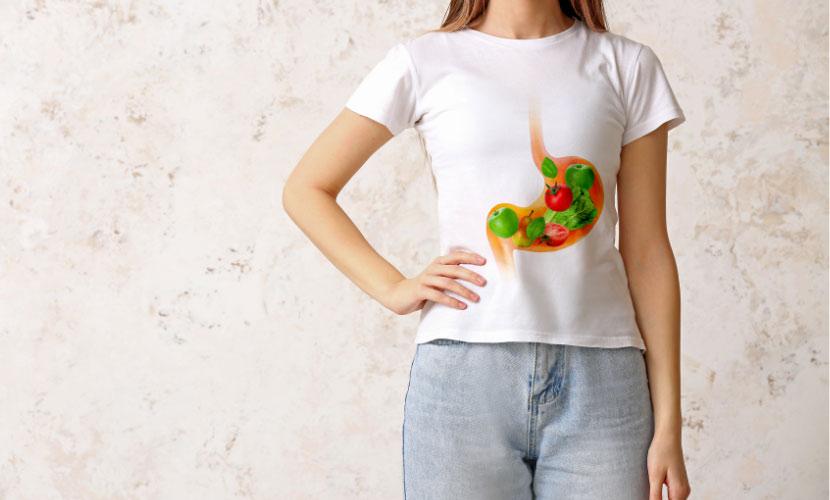🏆 As seen and loved on Shark Tank Dubai 🏆

You are What You Absorb
You are not what you eat, you are what you absorb!
A balanced diet provides you with all the essential nutrients, minerals, protein, vitamins, etc. to maintain a healthy life. Both the digestion and absorption of nutrients help to nourish your body. If your digestive system is not functioning properly, you may end up with various health issues.
Before the absorption of nutrients in the digestive system, your food is broken down into micronutrients and macronutrients, releases enzymes, and tiny compounds change the food structure to start the process of digestion. To maintain a healthy diet, you need to know these important factors such as how the process of absorption works and factors affecting digestion and absorption process.
What Is digestion?
It is a process in which large soluble food particles get torn down into smaller molecules that the body can absorb to provide energy and growth. The digestion process begins in the mouth and completes in the small intestine. The outcome of digestion from the digestive tract mainly in the small intestine and allows the further breakdown of nutrients to finish the process.
There are two kinds of digestion processes - mechanical digestion and chemical digestion.
Mechanical digestion
The process of mechanical digestion starts with the first bite of your food. The saliva secretes from the mouth helps you to chew the food and break them into tiny chunks to swallow the food easily
Before it moves on to the small intestine, the digestive juices in the stomach break the food into pieces. The pancreas and liver also contribute digestive juices to break down the food for nutrient absorption.
Chemical digestion
Chemical digestion refers to a biochemical process where macromolecules in food are converted into smaller molecules that are absorbed into body fluid.
Digestive enzymes also play a crucial role in the process of digestion which helps to break the nutrients into smaller parts. These are a kind of protein that catalyzes biochemical reactions. The digestive enzymes are discharged with the help of various glands at different stages.
For example - the digestive enzyme ptyalin helps in the process of chemical digestion of carbohydrates. It secretes in the mouth through saliva and tears down the starch into simple sugar such as dextrin, and maltose so that it can be absorbed in the small intestine.
Chemical digestion of protein occurs in the stomach with the help of the pepsinogen enzyme. Digestive enzyme lipase helps in the process of chemical digestion of lipids. With the help of pancreatic enzymes, the chemical digestion of nucleic - DNA & RNA in foods gets digested in the small intestine.
Some bacteria also contribute to the process of chemical digestion which boosts the secretion of digestive enzymes and absorption of minerals like iron and calcium. By following these methods digestion occurs in your body, absorbs the essential minerals, and nutrients, and eliminates the indigested products.
What Is Absorption?
The absorption of food is a process that helps you to absorb the digested molecules into the bloodstream and circulate them to the other parts of the body. The process of absorption starts after the completion of digestion in the small intestine.
Only small food molecules can go through the walls of the small intestine, whereas the large insoluble food particles go for further breakdown and elimination from the body.
Mucous membranes carry the digested food molecules to the bloodstream during the absorption of food in the digestion process. The process of absorption includes these four phases to absorb the nutrients properly.
- The process of Diffusion
- Active Transport
- Facilitated Transport
- Passive Transport
You need a healthy digestive system to absorb the essential nutrients for the optimal functioning of the body. So eating nutrient-dense foods such as salmon, kale, milk, and vegetables is important to keep the heart, liver, brain, and other body organs healthy.
Only eating food is not sufficient to get the minerals and nutrients. Proper digestion and absorption are also essential for a healthy life.
What Affects Digestion And Absorption?

Poor digestion and absorption of food may result in various health issues. Here are some crucial factors that affect the process of digestion and absorption.
Poor eating habits
Poor eating habits can reduce digestion and absorption power. Digestion starts from the mouth and proper chewing helps you to break the large food particles into small chunks.
Thoroughly chewing food increases the secretion of saliva and essential digestive enzymes by the stomach. It helps to complete the process of absorption quickly.
Excessive consumption of liquid
Drinking excessive water or any liquid can slow down the process of digestion and absorption of food. Water consumption during the meal dilutes the digestive enzymes that increase the time of digestion.
Drinking cold water is worse because the process of digestion is ineffective at lower temperatures. Flooding large food particles in the stomach affects your health.
Meal timing
If the meal timing is not properly maintained, the stomach empties early and releases semi-digested foods into the intestine. Because of this action, proteins get partially digested which may affect the immune system of the body.
If the new undigested food mixes with the partially or semi-digested food, it takes more time to complete the digestion and absorption of food which may increase fermentation and putrefaction.
Maintain the digestive limitations
Overheating stretches the wall of the stomach which creates irritations and other health issues. If an excessive amount of a particular nutrient is consumed, the glands cannot secrete sufficient enzymes to digest it properly.
As such, overheating a specific nutrient in the stomach is not good for health. Instead, leave some space to secrete juices that help in the digestion process.
Processed foods
Consuming excess processed foods such as high artificially preserved and chemically treated foods that are low in nutrients is extremely harmful. This is particularly true for high-sugar foods that reduce the magnesium from the body.
Stress factor
Eating food under stress slows down the digestion process. Anxiety, depression, and poor sleep can hamper the digestion and absorption process. If you eat mindfully and slowly, it helps you to digest the large food molecules systematically.
Alcohol consumption
Excessive alcohol consumption reduces the proper functioning of digestive enzymes. People who consume alcohol daily may not be capable of breaking down the nutrients from the food.
Drugs overdose
Taking unprescribed medicines consistently can damage the digestive tract. Some medicines reduce stomach acid and affect the digestion process. Instead of taking unnecessary pills, find out the root cause and try to consult a doctor in case of emergencies.
Effects Of Drugs On Nutrient Absorption
Some drugs may increase or reduce the absorption of nutrients in the digestive system. Drugs may increase the breakdown speed of a particular nutrient. Thus, the requirement for that specific nutrient increases in the dietary system.
Drugs can reduce or increase the urinary excretion of nutrients. Excess drug intake can cause serious health issues such as arthritis and bone pain, allergy, asthma, mood disorder, and other infections. These are the major side effects of drugs on nutrient absorption.
Changes in taste and smell
Some drugs may change the sense of smell and taste of certain foods. Nutrient intake may be affected because of lower food consumption and it may affect your immune system.
Appetite Problem
Drug overdose may bring changes to the appetite that include stimulation or suppression of hunger. It may lead to weight gain and other health problems.
Gastrointestinal issues
Several drugs can affect the digestive tract that includes nausea, stomach upset, vomiting, diarrhea, ulcer, and other major health issues. Some drugs can affect gastric acidity which may result in damage to mucosal surfaces and reduce the process of absorption.
Organ toxicity
Many drugs pass through the kidney and liver during excretion which may damage both the liver and kidney function. A high dose of drugs can affect the elementary process which results in urinary issues, kidney stones, and liver problems.
Metabolism issues
Some drugs may increase or stimulate insulin secretion in the bloodstream. This may cause diabetes, hyperglycemia- high blood glucose, and hypoglycemia- lower blood glucose.
How to increase nutrient absorption?
Several factors are responsible for improving nutrient absorption. Here are some nutrient intake recommendations that help in the absorption process.
Healthy Meal Courses
To get major nutrients such as protein, minerals, and vitamins, try to eat varieties of food items in one meal. For example, add roast vegetables with brown rice and plates of seafood that contain high omega-3 fatty acids.
We, at VMeals, provide different diet and meal plans as per your requirements. Try to add various foods but never exceed the amount of them. Irregularities or excess food can also hamper your nutrient absorption.
Add Healthy Fats In Your Meals
Fat-soluble vitamins like A, D, E, and K require healthy fats to absorb systematically in the body. You may use olive oil and flaxseed in food items to make them tastier as well as healthier.
Vegans can add nuts, seeds, and avocado that contain good fats which help you to amplify your nutrient absorption.
Avoid Drinking Tea With Your Meal
Drinking tea is beneficial for a healthy diet. However, excess consumption of tea or drinking tea at mealtime can hamper your digestive system as it contains polyphenols and other compounds. These compounds may reduce the absorption of other minerals and vitamins in the body.
Combine Vit C rich Foods With Iron
For vegans and people who consume vegetarian diets such as legumes, dried fruits, nuts, and other green vegetables; combining them with vitamin C-rich foods can help you to get more nutrients.
Eat vitamin C-rich foods and fruits such as lemon, oranges, capsicum, and green chili. Vitamin C helps you to increase the immunity level of your body which protects you from the attack of foreign viruses and diseases.
Bottom Line
Eating good food is not the only key that keeps your digestive system healthy. Along with a healthy diet plan, you need to digest and absorb the food properly.
For a healthy life, absorption of nutrients in the digestive system is essential which provides you more energy and immunity to protect your body from diseases.
We offer a balanced diet plan and healthy meals at your doorstep. If you are unable to manage your regular diet due to a busy schedule or are tired of eating the same boring foods, get in touch with us for not only healthy but also delicious dishes at the same time.
Reach out to start your fitness journey with us!
Meal Plans
Delivery Details
Legal Information
© 2020-2026 VMeals. All rights reserved. VMeals™ is a trademark of Flip Side Restaurant and Cafe L.L.C
We accept
